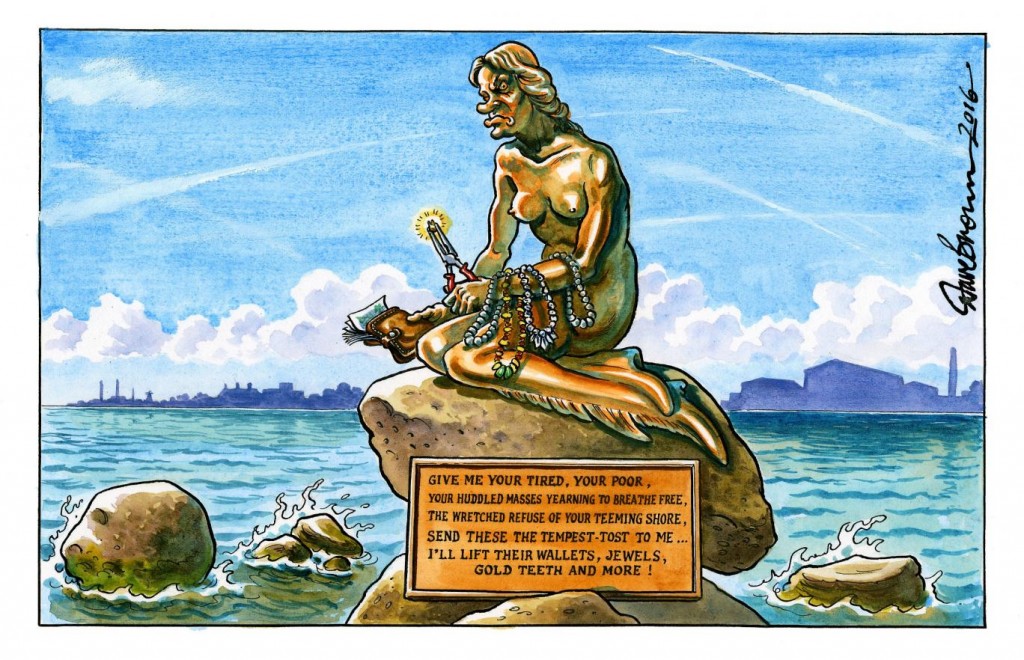News item: Denmark approves controversial refugee bill allowing police to seize asylum seekers’ cash and valuables
Yep. You’re reading that rightly. Denmark’s right-wing minority party managed to persuade both the opposition party and the anti-immigrant one that taking assets from refugees who’ve just risked their lives and traveled thousands of miles was an ethically and morally sound thing to do.
That’s quite unlike Denmark’s World War 2 history, when the Danes managed to smuggle roughly 7,200 of its 7,800 Jews out of the country to Sweden before the occupying Germans could kill them.
As you might expect, there’s a backlash from foreign governments and NGOs.
I understand that the Danish government is feeling overwhelmed. According to its figures some 9,700 asylum seekers arrived in the country in the first nine months of 2015. On the other hand, Denmark’s a pretty wealthy country, which can probably absorb that many pretty easily. It doesn’t seem to want to try.

I think it’s the seizure aspect of it that sounds particularly harsh.
The defense that I’ve read, is that economic assistance through Denmark social insurance for Danes has pretty low & strict asset tests.
But I think it’s the part where the government will be seizing relatively meager belongings of displaced refugees, that seems punitive. Also, that they will be sooner and more reliant of public aid and charity, and more desperate for even low paid work, so it smacks of creating a servant class of refugees needlessly.
But an issue I see with this is that they are exempting wedding rings and cell phones, and other stuff like that. Which seems reasonably kind to sentiment, of course.
But this of course just gives an opportunity for gaming the system which naturally creates a bizarre and probably unfortunate arbitrage opportunities which won’t be helpful to anyone much.
Savvy immigrants in Denmark, as savvy poor in the US, will simply shift their assets to non-countable belongings, in order to avoid seizure or failure of asset tests.
It’s long been a strategy of the unbanked poor to reserve money in things which are easy to carry on one’s person, and therefore less easy targets of burglary & theft, and practically invisible to government authority counting & tracking.
This is, of course, much of the reason one can occasionally notice poor people with strangely expensive jewelry. It’s a way people can reserve money if they are, for whatever reasons, unable to do it at a bank.
It will be interesting to see if there’s any uptick in jewelry sales & smart phones in Denmark as a result!
Savvy merchants in these lines of business in Denmark are probably right now stocking inventory based on what types of exempt items might be considered valuable storage of meager amounts of wealth.
The way I see it, Denmark may have just passed a law to subsidize jewelry and cell phone merchants, while effectively driving money out of the banking system and into the grey and black markets.
But of course the actual purpose of the law was probably to try and make Denmark seem less attractive to refugees. That may not work simply because refugees, by very definition, are desperate. They go to countries where they know they won’t be allowed to work. They go to countries where they know people hate them. Why would they be kept away by threat of having cash assets seized if the alternative might be death?
I think it’s assets above $1,500, which would exclude most worn jewelry, I’m guessing. The goal was to do exactly as you say in your last paragraph: keep them from coming to Denmark in the first place. There are a lot of xenophobic political parties in Europe, but most don’t have much power in their countries’ parliaments. In Denmark they do.